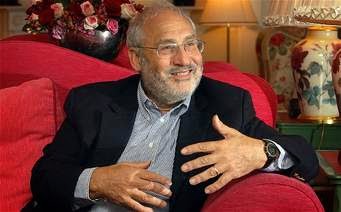WEB ECONOMY : FRICTION FREE CAPITALISM...
×××××××××××× ××××××××××××
( Joseph Stiglitz ) .
××××××××××× ××××××××××××
One of the basic principle of the traditional economic model
has blown up and it is the perfect news for all the economic operators :
Consumers , investors , workers and entrepreneurs .
Actually , this has always been a weakness in economism .
Thanks to internet this issue is on the front burner .
Everybody believed that internet would provide us with all the necessary
economic information , creating a situation of
" friction-free capitalism ".
Joseph Stiglitz , Nobel Prize for Economics in 2001 , wrote
" for over 100 years the economy has created models that are thought to
deliver perfect information . Of course everybody acknowledges that information
is incomplete : but everybody hoped that the economies with less perfect
information would look more like the economic models with perfect information
.
One of the main results of my research was to demonstrate that it is not
true : the slightly imperfection in the information could cause a deep effect on
economic stability ".
In the 18th and 19th centuries economists were aware of how
unrealistic the idea of perfect information was delivered by the economic
actors .
But the economy of the 20th century has completely ignored that information
distortions affect the fundamental conditions of the data analysis , therefore
they decided not to take them into consideration .
Joseph Stiglitz wrote " my research concluded that that kind of approach
was wrong . Different people know different things.
Workers know better their skills than the company that
employs them ".
The different economic operators never have the same information regarding
different business transactions .
Many have claimed that , thanks to Internet , it was time for all
information to be equally delivered , notably because the cost of publishing and
finding information has dropped dramatically .
Bill Gates has introduced the concept of " friction-free capitalism" ,
which means cheaper transactions and more perfect information .
But the web has created even more new assymetries , not only for digital
divide , that is the increasing distance between people connected to Internet
and those who , for economic reasons cannot access the web . Internet has
created the so-called information overload : an unbearable massive bombardment
of information . A bombardment that favours some people more than others .
Herbert Simon , Nobel Prize for Economics in 1978 , psychologist , used to
say " hence a wealth of information creates a poverty of attention ".
Nobody wants Internet to provide equal access to information :
For example , we ask the protection of privacy in order to counteract a too
much intrusive information system .
Furthermore , the capitalist oligarchies want to maintain the control over
the media because they generate high profit but they do not guarantee
transparency just because of Internet .
In short , well-informed markets are a theoretical invention groundless .
But if the markets cannot be well-informed there is no ground for perfect
competition .
And if not information is not fairly distributed , it will always
be asymmetric .
This situation blows the neoclassical model up : the neoclassical model
moves from an assumption that is true only if it is perfectly false and , as it
cannot always be true , it is
always false . But if the market is always imperfect , the legislation
claimed by the economist model are not valid anymore. With no external
interventions , the resources are inefficiently , unfairly and unequally
distributed by the market .
The economic discipline is not self-sufficient .
In order to understand economy , culture and social structure become
important in economic analysis .
The same applies to information which , in our era ,
correspond to the web...
÷÷÷÷÷÷÷÷÷÷÷÷÷÷÷÷÷÷÷÷÷÷÷÷÷÷÷÷÷÷÷÷÷÷÷÷÷÷÷÷÷÷÷÷÷÷÷÷÷÷

